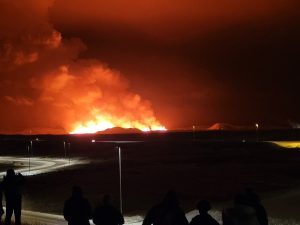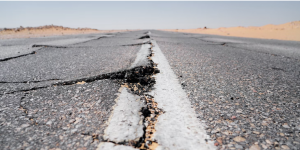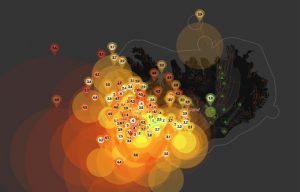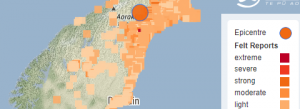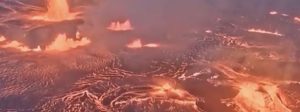A violent eruption of an underwater volcano near the Kingdom of Tonga jolted the Pacific island nation and the surrounding regions on Saturday, January 15.
The powerful eruption in Hunga Tonga-Hunga, which also triggered a tsunami, was likely the biggest recorded in the world in over 30 years, according to a CNN report.
Footages that surfaced on social media showed water washing through a church and several homes, and witnesses said ash was falling over the capital, Nuku’alofa.
Also Read: Tsunami hits Japan’s Pacific coast after underwater volcano erupts in Tonga
Here is what we know so far.
The Hunga-Tonga-Hunga-Ha’apai volcano has erupted repeatedly in the past, at a noticeable scale in 2009 and 2014/15. But the latest eruption was the most powerful, as a huge plume of dust and steam spread up to 20 kilometres into the atmosphere and tsunami waves crashed across the Pacific.
The tsunami hit the largest island in Tonga, Tongatapu, with waves recorded at 1.2 meters, flooding coastal roads and properties.
Warnings were issued across the Pacific Island to Fiji, Somoa, and Vanuata, among other nations. Similar warnings and advisories were given in New Zealand, Japan, Peru, the United States, and British Columbia in Canada.
Also Read: Volcano eruption in Tonga sends tsunami warnings across Pacific
The waves hit the US West Coast, California, Alaska, Hawaii, and Japan’s Iwate.
The US Geological Survey estimated the spectacular eruption caused the equivalent of a magnitude 5.8 earthquake.
Also Read | Weather disasters cost $170 billion worth damages in 2021, $20 bn more than 2020
Climate experts have said that the eruption might have altered atmospheric pressure which helped clear the fog out in Seattle, US, according to Hindustan Times.
The waves crossed the Pacific, drowning two people in Peru and causing minor damage from New Zealand to Santa Cruz, California.
Also Read: Tonga volcanic eruption sparks tsunami; warnings issued for US West Coast
No confirmation about mass casualties has been received so far, as communication is yet to be reestablished with parts Tonga.
Tonga “needs immediate assistance to provide its citizens with fresh drinking water and food,” the country’s Speaker of the House Lord Fakafanua said on social media. He said “many areas” had been affected by “substantial volcanic ashfall” but “the full extent of the harm to lives and property is currently unknown,” reported CNN.
Also Read | 17 years since the deadly 2004 Indian Ocean Tsunami, a look back
Australia’s Minister for International Development and the Pacific, Zed Seselja, said there was “significant property damage” in Tonga, including to roads and houses. He said there is still “very limited, if any” information coming from the outer islands.
“From what little updates we have, the scale of the devastation could be immense, especially for outer lying islands,” Katie Greenwood, IFRC’s Pacific Head of Delegation said, according to Reuters.
New Zealand Prime Minister Jacinda Ardern said there had not yet been any official reports of injuries or deaths in Tonga, but cautioned that authorities hadn’t yet made contact with some coastal areas and smaller islands.
She added that New Zealand had been unable to send a military surveillance flight over Tonga on Sunday because the ash cloud was 63,000 feet (19,000 meters) high.
“Communication with Tonga remains very limited. And I know that is causing a huge amount of anxiety for the Tongan community here,” Ardern said, reported Associated Press.
(With agency inputs)

